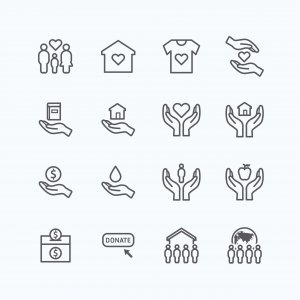Erica Verrillo is President of the American ME and CFS Society (AMMES)
When I was a child, my mother taught me the three basics of human survival: Food, clothing, and shelter. These, she said, are essential for our existence. At the time, I understood food to be essential, and possibly shelter, but I did not see the necessity for clothing. (I do now.)
Getting medical help and treatment is a priority for ill people. This makes perfect sense in the context of a debilitating disease like myalgic encephalomyelitis, aka chronic fatigue syndrome (ME/CFS). Everyone with a chronic illness wants to recover. But people who are so impoverished that they can’t afford food, clothing, and shelter face a struggle for survival on a daily basis. That struggle can overshadow all others – including the search for physicians and treatments – while patients scramble for their basic needs. The effort to stay alive is all-encompassing.
How will these patients get food to eat, pay their rent, and buy the bare essentials?
Who will help them when their options run out?
Food
Nobody in this country should suffer from hunger, especially given the fact that 40% of our produce ends up in landfills simply because it does not meet the aesthetic standards set by supermarkets. There is enough food for everyone, and more. And yet, the elderly, the poor, and the chronically ill routinely go hungry. These are the at-risk populations that can easily “slip between the cracks” even with programs such as food stamps available.
The problem of food insecurity is even more problematic among patients with ME/CFS, many of whom suffer from multiple food sensitivities and allergies. Even if a patient is lucky enough to live in an area with a food pantry, the majority of the products donated are filled with preservatives and additives that most patients with ME/CFS cannot tolerate. Patients with ME/CFS need a diet that is wholesome and does not increase pressure on the liver and other elimination systems.
Most applicants to the American ME and CFS Society’s (AMMES) financial crisis fund have mentioned difficulty obtaining adequate food. In one case, a patient reported that she had no food at all in her kitchen. Because of the government shut down, she had been unable to get food stamps, and with the month-long delay, she had simply run out of food. AMMES immediately sent her a check to cover three weeks of food.
Other applicants who are fortunate enough to live in areas with food pantries report that getting to these locations is nearly impossible. Often they do not have transportation, which means they are dependent on whatever local supermarkets have to offer. When they have to pay more for food, they end up balancing those costs against rent and utilities. If you have to choose between food and a roof over your head, you are truly in a Sophie’s Choice dilemma.
Clothing
For most of us, it is hard to imagine being in dire need of clothing. Unless people are living on the street, clothing can be obtained relatively cheaply. There are Goodwill and Salvation Army stores everywhere. But there are certain items which really should not be purchased used – such as underwear.
One applicant to the AMMES financial crisis fund reported that she had no clothing at all. Her abusive ex-boyfriend had destroyed all her clothing, including her shoes. She had been wearing flip-flops to her medical appointments for months. In addition, she had no proper undergarments. AMMES helped her to purchase shoes and clothing that fit her. We have also purchased outdoor clothing for the winter months, such as coats and sweaters.
Several applicants have reported that they had not been able to afford undergarments or street clothes for years. One applicant said, “This may not seem like a big deal, but I could really use a bra.” Clothing might not seem as critical as having food on the table and a roof overhead, but the fact is that serviceable clothing is important. Patients going through “the system” to obtain food stamps and fuel assistance, will be treated better if they do not appear in clothing that either doesn’t fit, or is falling apart. The same holds true for doctors. We are judged on how we appear, and how we are treated follows accordingly.
In this country, poverty is treated as if it were a character flaw. Looking impoverished is simply another obstacle in the way of getting help. Presentable clothing not only makes it easier to get assistance, it restores dignity. After being routinely dismissed, and struggling for years with a system that does not believe them, restoring a sense of internal worth in these patients is vital for their well-being.
Shelter
In a previous article, Homeless: How AMMES Is Keeping People With ME in Their Homes, I discussed homelessness among people who are seriously ill with ME. For those who have lost their incomes, losing their homes is right around the corner. For the most part, AMMES has prevented evictions simply by paying rent. But there are also other ways AMMES keeps people in their homes.
Having a roof over your head is important, but once that roof is secured, the benefits of having that roof must be secured as well – namely electricity, heat, and running water. Several people who have applied for the AMMES fund have been unable to pay for their basic utilities. They were either on the verge of being cut off, or were facing fines and late fees. A house without heat and running water is basically a squat, so AMMES paid those bills. We have also paid for fixing broken doors, toilets, security deposits, and other necessary costs for maintaining a home.
Testimonials
The people we have helped are extremely grateful for the assistance AMMES has provided. What is more, every one of them has asked, “How can I give back?” Their desire to help other patients is a testament to the powerful impact that support can have. It is also very welcome. Someday, when they are more recovered, I believe they will indeed help other patients who are severely ill and penniless. Meanwhile, some of our applicants (and others) have left glowing testimonials on Great Nonprofits. This is what they have to say:
“I must start with the fact that there is a zero percent chance that I would be alive today if not for AMMES stepping in with little notice to save my life. This organization truly serves those that it states they assist.” ~Sully
“AMMES offered me understanding and peer support, as well as tangible economic assistance that helped to avoid financial disaster and likely homelessness. We need more of the crisis intervention that AMMES provides since so many people with ME have no resources or personal support. Many rely on government programs that force us into poverty. AMMES addresses poverty and its consequences through informed, direct services.” ~Client served
“AMECFS [sic] has become a caretaker for those facing the pain of this illness alone. The foundations generosity of spirit to give funding to help so many of us is truly a blessing. With nowhere else to turn for help, AMECFS is filling a very much needed role in the community and patients’ lives.” ~Sharinghope
“Erica president of (AMMES) was a true blessing from God in heavens above. She paid my caregiver that I was at risk of losing due to no money to pay for my care for me and my kids. She paid off my security deposit and has been paying all utilities and even helped us get clothing by sending money when abuser trashed my house. If I didn’t get blessed with this beautiful kind hearted lady I would of lost my life my mind and my house and kids.” [lightly edited for punctuation] ~Lynnette
You can help!
Please help us continue our mission! The AMMES financial crisis fund depends on donations. Our overhead is negligible, which means 100% of all donations goes toward serving those in need.
I cannot stress enough how vital this work is. Nothing is more important than saving a life. You can help us do just that.
To donate go HERE.
To read more about the fund, go HERE.
If you like what we are doing, please leave a review HERE.
Volunteers for AMMES are warmly welcomed! And AMMES still has board positions that need to be filled. Please contact Erica Verrillo at admin@ammes.org






2 thoughts on “Food, Clothing and Shelter: Delivering the Basics to People with ME”
This is amazing!
I was not aware that there was a group trying to fulfill these critical needs for PWME when I wrote the “ME Seniors Bill of Rights” article for MEAction News. We need to promote awareness of the need for donations to this fund.
As we promote awareness of the plight of PwME this month, we can also promote awareness of this fund. Do you have a hashtag for donations to this fund?
Thank you for this article! I had not even been aware that SOMEone was trying to help PwME who find themselves in dire straights. Sharing and following links in article now.
Comments are closed.